Anthea Kerr Award
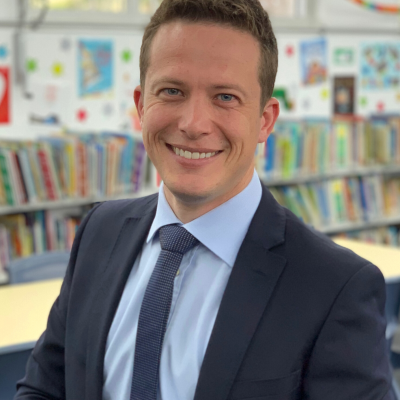
Andrew Clifton
Assistant Principal, Curriculum and Instruction, Millfield Public School, Department of Education
Andrew is an amazing educational leader who has demonstrated strategic leadership of staff, management of multiple whole-school programs and outstanding support of students though positive working relationships with our community. He has shown outstanding commitment towards improved practice in literacy and numeracy leading to positive growth and achievement. His interpersonal and intrapersonal skills allow him to work side by side with teachers and achieve growth in a considerate and differentiated way.
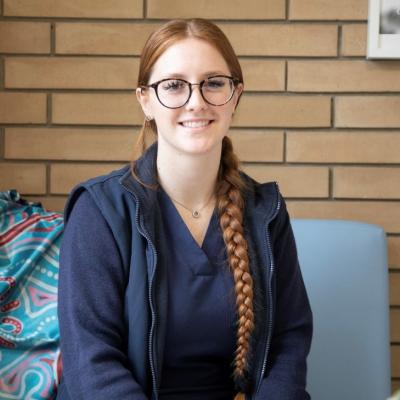
Courtney James
Registered Midwife, Aboriginal Midwifery Caseload Model, Western Sydney Local Health District
Courtney is a proud Wiradjuri woman and a talented and caring midwife in the new Aboriginal Caseload Model at Westmead Hospital, known as Dragonfly Midwifery Caseload. This model of care was introduced to provide culturally sensitive care to Aboriginal and Torres Strait Islander women during pregnancy, birth and the postnatal period. Courtney has been instrumental in the ongoing development of the Dragonfly model by driving the design of the Antenatal outpatient clinics. Her understanding of Indigenous communities is evident in how she conducts herself in all interactions with the women and families. Courtney 'walks the talk' and educates other midwives about cultural awareness and cultural sensitivity.

Mary Nguyen
Master Program Manager, Transport for NSW
Mary has proven herself as one of Transport’s highest achieving young employees. Her engineering and planning capability has led to the development of multiple innovative solutions in one of the cluster's most complex areas – trackwork possession management – which involves long-term planning, coordination of hundreds of worksites and safety in consultation with a multitude of stakeholders. She is an inspiring leader, mentor and advocate, and regularly conducts workshops across the cluster to facilitate innovative solutions. Mary is invaluable to the organisation and her innovative accomplishments have proven instrumental to Transport's continued improvement and commitment to keep Sydney moving.

Rosie Oldfield
Strategic Projects Officer, Department of Enterprise, Investment & Trade
Rosie embodies the values of public service and is passionate in delivering for the people of NSW. She combines deep analytical and project management skills with an inventiveness and desire to get the best outcome, which has led to the success of each project she’s been involved in. She inspires those around her to make the seemingly impossible, possible. She has a knack of taking on wicked problems, breaking them down into manageable parts and then bringing together teams to make opportunities happen. She also drives the Young Professionals Network for the DPC and DEIT Cluster to build connections and culture.
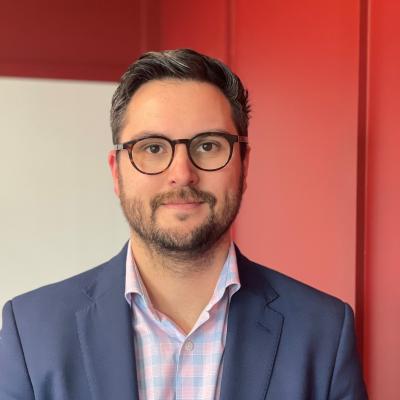
Alexander Pritchard
Senior Manager, Airport Hotel & Quarantine Operations, HealthShare NSW
In his role as Senior Manager, Alexander led the transport of COVID-19 symptomatic people to and between health hotels from Sydney Airport and Police hotels, and the transfer of COVID-positive patients from NSW Hospitals. Following the Delta outbreak, the team’s work rose from 97 transfers per week to over 1,700 per week, requiring them to move to a 24-hour service. Despite the challenging nature of the work, Alex ensured his team were well supported while working collaboratively with local health districts to achieve the best outcomes for patients.
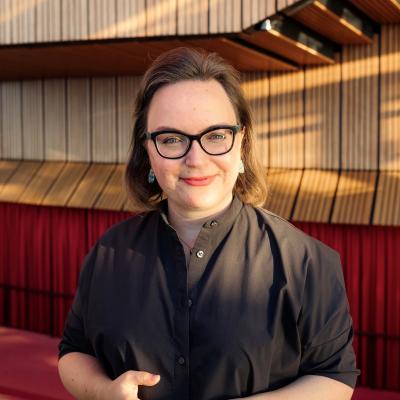
Anna Yanatchkova
Senior Manager, Global Goals, Planning and Engagement, Sydney Opera House
Anna believes that art and culture are a catalyst for change and has dedicated her career to realising this in NSW arts-based public sector organisations. Anna led the development and implementation of the Sydney Opera House’s first Diversity, Inclusion and Belonging Strategy, has deepened the organisation’s Reconciliation Action Plan commitments, and developed a holistic approach to social and environmental sustainability through the UN Sustainable Development Goals. Anna has been instrumental in deepening the Opera House’s understanding of and capacity to deliver positive social impacts. She is a dynamic and committed leader with great future-facing value to add to the public service and the NSW community.
NSW Public Servant of the Year

Professor Golo Ahlenstiel
Clinical Network Manager Speciality Medicine and Senior Medical Advisor inTouch COVID Care in the Community, Western Sydney Local Health District
Professor Ahlenstiel has coordinated the care of many thousands of patients in Blacktown and Westmead Hospitals and in the community during the pandemic, saving many lives. At any point in time, COVID-19 cases in western Sydney have accounted for 15-23 percent of all cases in NSW. His leadership approach has been coordinated, diplomatic, clear and precise, and provided tremendous support for the many staff working with him. Professor Ahlenstiel tracked the demand for new treatments in real time, many of which were being used clinically for the first time, and supported patients and staff in their use.

Dr Shopna Bag
Director of Public Health Unit, Western Sydney Local Health District
Dr Shopna Bag is an extraordinary leader whose example of expertise delivered with care and compassion has stood out over the past year – particularly throughout the pandemic. Shopna consistently demonstrates a commitment to understanding the local western Sydney community and empathy towards all staff, patients and carers. She successfully engaged internal and external stakeholders, provided advice on the rapidly evolving COVID-19 guidelines, and informed the development of local policies and procedures to support compliance with guidelines in clinical and non-clinical areas across the health district.
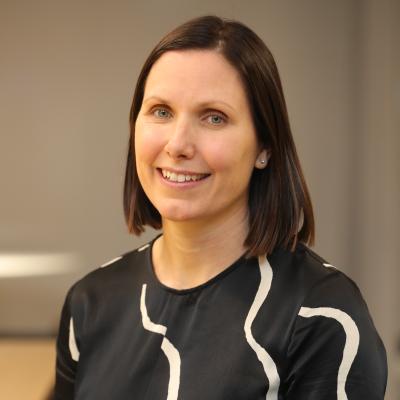
Megan Byrne
COVID-19 Vaccination Lead and Head of Department, Dietetics and Nutrition, Western Sydney Local Health District
Megan fosters a culture of clinical excellence, quality improvement and recognition within her team. She is a highly capable senior leader and set up the Blacktown COVID-19 Vaccination Hub in 2020, coordinating all staff and resources in her role of managing Operations. She was an early advocate for adapting the way vaccinations were delivered to patients with complex needs requiring low sensory environments. Megan was identified as the best person to fill the role of Operations Director for the Qudos Bank Arena Vaccination Hub, where she facilitated the delivery of over 360,000 COVID-19 vaccinations to the people of NSW in 10 weeks.

Amanda Causley
Welfare Services Functional Area Coordinator for Northern NSW and Community Services Caseworker, Department of Communities and Justice
Since the northern NSW floods began earlier in 2022, Amanda has spent countless hours coordinating 54 evacuation centres. Working around the clock, she prioritised the care and safety of disaster impacted communities, evacuation centres and staff to ensure they were supported. Amanda did all of this with a smile and remained calm despite the massive challenge she faced. She is very respected within the DCJ Disaster Welfare space, and Resilience NSW have also noted that she never faltered in her leadership and remained responsive and calm whilst under a significant amount of pressure.
Louise Herron AM
Chief Executive Officer, Sydney Opera House
The Sydney Opera House has been renewed for future generations of artists, audiences and visitors under the visionary leadership of Louise Herron AM, who has overseen a transformative, complex decade of renewal that comes to fruition this year. From the start of her tenure as CEO almost ten years ago, Herron has reimagined the Opera House’s potential as Australia’s cultural icon and one of the world’s busiest performing arts centres. Now, as the Opera House prepares to mark its 50th anniversary, the community is experiencing the culmination of a remarkable transformation of the building and precinct and the organisation that brings them to life.
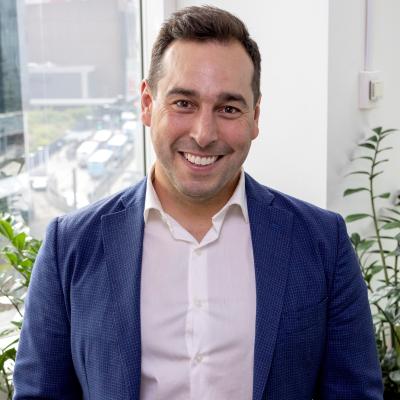
Joseph La Posta
Chief Executive Officer, Multicultural NSW
When COVID cases began to rise, Joseph’s advocacy for multicultural communities enabled NSW Government to reach these communities in new and engaging ways. He personally lobbied across government to secure more than $50 million in grant funding so that vulnerable communities could endure lockdowns and emerge stronger. He knew that providing communities with information in their language, from trusted community leaders, would have the best outcomes for all of NSW, and partnered with SBS to provide interpreting of daily press conferences in 10 languages. He also successfully advocated for pop-up testing and vaccination centres in existing community hubs and places of worship.
A Strong Economy
Supporting home ownership for Aboriginal people
Aboriginal Housing Office
To address the disparity in home ownership in NSW between Aboriginal and non-Aboriginal families, the Aboriginal Housing Office developed the Aboriginal Home Buyer Saver Grants Project. The project enables Aboriginal people to overcome barriers to achieve home ownership and all its associated economic and social benefits including intergenerational change. The scheme consists of three grants that eligible Aboriginal people can apply for to access a one-off financial boost. The project addresses the Premier’s Priority to increase home ownership and contributes to Closing the Gap target 9, that Aboriginal and Torres Strait Islander People secure appropriate, affordable housing that is aligned with their priorities and need.
The RNA Pilot Facility and research initiatives
Department of Enterprise, Investment and Trade
NSW is known globally for its early-stage RNA research and development capability. The project team identified an opportunity to leverage this capability to translate local research into a self-sustaining RNA industry with homegrown vaccines and therapeutics. A targeted solution was developed through collaboration and rapid project mobilisation with local researchers and NSW Government agencies.This included an RNA Pilot Facility where researchers and RNA companies can conduct clinical trials, and research and development initiatives that fill the gaps to translating RNA research into market-ready products. The project positions NSW as a first mover in commercialising RNA research within Australia and the Asia-Pacific.
Partners: The NSW RNA Bioscience Alliance (comprising all 14 NSW and ACT universities), the NSW Vice Chancellor’s Committee (VCC), NSW Health, Health Infrastructure
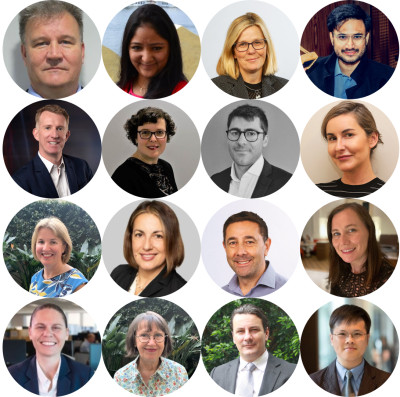
Construction industry shutdown response
Infrastructure NSW
In July 2021, there was a construction pause across Greater Sydney to reduce COVID-19 transmission. To mitigate the economic impacts, Infrastructure NSW immediately established a Construction Reopening Team to develop a pathway to safely reopen construction. This resulted in construction resuming quickly and the industry becoming an early leader in COVID-safe work practices and vaccination.
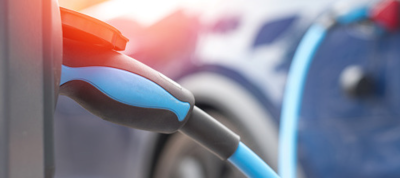
NSW Electric Vehicle Strategy
Office of Energy and Climate Change, NSW Treasury
Light vehicles account for around 10 percent of greenhouse gas emissions in NSW, and in April 2021, the State had not progressed an Electric Vehicle Program under its Net Zero Plan. The OECC, Treasury and Transport worked together to develop the nation-leading NSW Electric Vehicle Strategy in just 2 months. Because of the program, tax reforms have been legislated, incentives are available to help people and organisations buy an electric vehicle and programs have been launched to create a world-class electric vehicle charging network.
Partners: NSW Procurement, Transport for NSW, Revenue NSW, NSW Treasury, Department of Planning and Environment
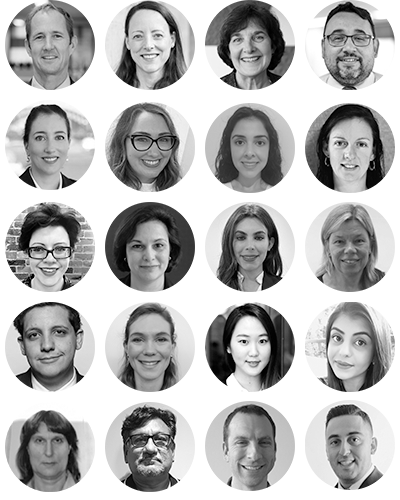
A competitive, fully electronic conveyancing industry
Office of the Registrar General, Department of Customer Service
In October 2021, NSW moved entirely to eConveyancing, ending more than 150 years of paper in the conveyancing industry. The ORG built a world-first legislative framework and a new national online platform, co-funded with the private sector. The team worked with lawyers, conveyancers, and financial institutions to transform their business practices from paper to a fully digital system, leading to other private operators entering the eConveyancing market. The ORG continued to lead national reform by working with stakeholders across the private and public sectors to pass legislation requiring operators to interoperate their back-end systems, leading to more competition and more choice for customers.
Partners: Revenue NSW, Australian Registrars’ National Electronic Conveyancing Council (ARNECC), Australian Banking Association, Australian Institute of Conveyancers, Law Council of Australia
Moving more with less – Snowy Hydro 2.0
Transport for NSW
Snowy Hydro 2.0 is a renewable energy project that expands on the original Snowy Mountains Hydroelectric scheme. 20 seven-kilometre-long concrete-lined tunnels will connect two existing dams and an underground power station. Construction required transportation of 140,000 concrete tunnel segments through the local Cooma and Adaminaby communities. To reduce the impact on local communities and roads, the Freight Branch collaborated with industry experts to design an innovative 'fit for purpose' transport solution. The project reduced the number of heavy vehicle movements by 67 percent, taking tens of thousands of heavy vehicle movements off roads and resulting in time and cost savings.
Partners: Future Generation
Excellence in Digital Innovation
Digital Birth Certificate
NSW Registry of Births, Deaths and Marriages
The birth certificate is the standard legal identity document Australian citizens need to participate in society. The National Product Team conducted customer research that indicated 80% of Australian citizens would actively use a digital birth certificate if it was easily accessed and universally recognised. In conjunction with technology consultancy Thoughtworks, the team designed the world’s first Digital Birth Certificate, which will be housed in a dedicated secure app and provide easy access to customise and share the certificate. This removes the inefficiency of accessing the paper certificate while increasing security regarding acceptable formats.
Partners: Thoughtworks
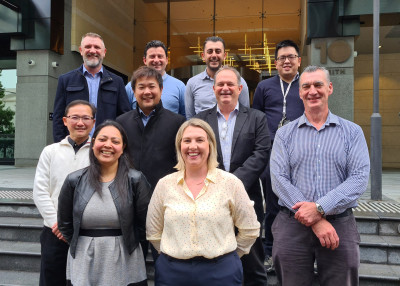
M4 Smart Motorway – NSW’s First Smart Motorway
Infrastructure and Place, Transport for NSW
Traffic growth on the M4 Motorway requires intervention to ease congestion and improve safety amidst western Sydney’s growing population. NSW's first “Smart Motorway” technology will ease congestion and better manage traffic flows. Major improvements have been linked to a Managed Motorway System that controls traffic movements and helps manage incidents on the motorway to reduce impacts to traffic flow. In the first year of operation, the M4 Smart Motorway saw a 6-minute improvement in travel time from Penrith to Parramatta, and more importantly, an up to 40 percent reduction in serious traffic accidents.
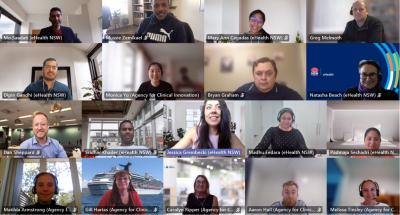
Measuring what matters: Patient Reported Measures
NSW Agency for Clinical Innovation
The Patient Reported Measures program enables patients to provide direct, timely feedback about their health experiences – a critical component of achieving NSW Health’s vision for truly integrated, better value care across the state. Patient surveys are used to give clinicians real-time insight into patients’ needs and experiences at the point of care, helping clinicians understand what matters to patients and provide more effective care. A purpose-built IT platform, the Health Outcomes and Patient Experience, enables real-time data capture so that patients and carers can provide feedback about their outcomes and experiences from their personal electronic devices.
Partners: eHealth NSW
Opal Digital Card
Transport for NSW
With digital payments becoming more popular, the way customers choose to pay for transport is evolving. In December 2020, the revolutionary Opal digital card was launched as a 12-month trial for 10,000 customers. Stored in a mobile device’s digital wallet, the digital card allows customers to tap on and off public transport with their phone or smart watch and access all the benefits of using a physical Opal card and a seamless customer journey. The results from the trial were resoundingly positive with over 80 percent of participants stating they would use the Opal digital card again.
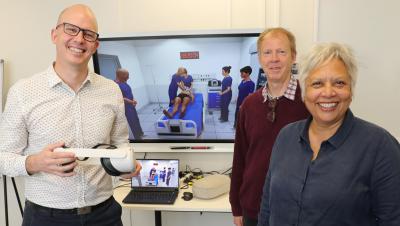
Utilising virtual reality to supplement clinician education
Western Sydney Local Health District
Increasing pressures on clinicians’ time have forced healthcare systems to create efficient ways of addressing the educational requirements of healthcare providers. Western Sydney Local Health District partnered with the University of Sydney to supplement clinician education in identified areas of need with locally developed virtual reality training. While traditional immersive education methods are often expensive and inflexible, this training capitalises on virtual reality’s cost-effective, scalable method of communication.
Partners: The University of Sydney, Frameless Interactive
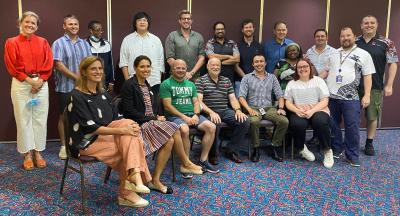
Virtual Rural Generalist Service
Western NSW Local Health District
Across NSW and Australia there are longstanding challenges in recruiting doctors to rural communities. The Virtual Rural Generalist Service is a support service for western NSW hospitals that enables rural generalist doctors to provide virtual and face-to-face medical coverage to vulnerable rural communities. Since implementation, there has been improved access to medical support close to home and on country, high service uptake, high patient satisfaction, and improved support for retaining rural GPs. This is a sustainable solution that supports recruitment and retention of medical staff to rural hospitals and multipurpose services into the future.
Highest Quality Education
Aboriginal Language and Culture Nests
Language and Culture team, Aboriginal Outcomes and Partnerships Directorate, Department of Education
The Aboriginal Language and Culture Nest initiative delivers training to schools to support a whole-of-school approach to Aboriginal language teaching. The team developed workshops in 5 locations across NSW to ensure that Aboriginal Language was embedded in all school activities, not just during formal lesson times. This required innovative delivery methods that incorporated Aboriginal cultural knowledge as well as working with school curriculum, localised to each Nest location. The Nests were delivered across the state over 2021 and 2022 and were incredibly popular among schools.
Partners: NSW Aboriginal Education Consultative Group
Careers NSW pilot
Strategic Priorities, Department of Education
After the pandemic caused the loss of hundreds of thousands of jobs in NSW, filling workforce shortages became a top priority. Careers NSW was created to connect people with personalised career information and guidance, wherever they are in their careers. Careers NSW was delivered in close collaboration between the Department of Education, Service NSW and the Department of Customer Service. Under a tight turnaround, the team went above and beyond to design a customer-centric self-service website, provide careers guidance from career development practitioners, and secure volunteer industry experts and high-profile ambassadors. Since October 2021, Careers NSW has connected over 92,000 NSW customers with career guidance.
Partners: Service NSW and the Delivery Unit, Customer, Delivery and Transformation, Department of Customer Service, and Department of Education
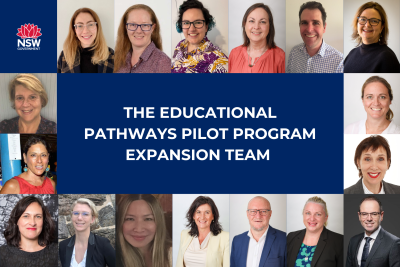
Educational Pathways Pilot Program expansion
Education and Skills Reform, Department of Education
To help increase the proportion of young people participating in higher education, training or work, the pilot Educational Pathways Program was launched in 2020, in 24 high schools across south-west Sydney and the north coast. The pilot included 10 initiatives, including the creation of new staff roles in schools that explore opportunities for students to gain careers education and Vocational Education and Training experience. The successful pilot led to the expansion of the program in 2022 to include 121 new schools across seven regions, involving a total of 145 high schools in nine regions across NSW.
Partners: TAFE NSW
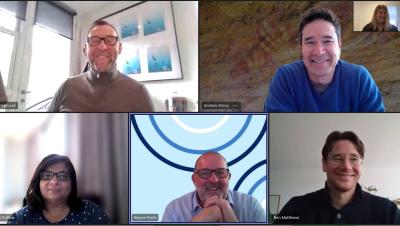
Rural Access Gap program
Information and Technology Directorate, Department of Education
Key metrics indicated a growing gap between metropolitan and regional schools and inequities in access to digital tools. To address this divide, the Rural Access Gap program set out to build digital capacity, efficacy, and capabilities by supporting over 1,000 rural schools in enabling digital classrooms. So far, the program has led to an improved 1:4 device-to-student ratio, provided nearly 13,000 teachers with access to a personal device and ensured higher internet connectivity speed across nearly 1,000 schools. This comprehensive approach provides the foundations for lifelong learning and ensures all students get quality education no matter where they live.
Partners: Department of Customer Service
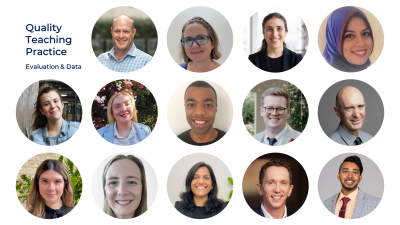
Improving HSC Outcomes with a Step Change in Evaluation
Quality Teaching Practice – Learning Improvement, Department of Education
To support an improvement of student achievement in the HSC, the Quality Teaching Practice Evaluation and Data Team used embedded evaluation to provide timely and relevant insights to the HSC Strategy Team. These insights enabled the Strategy Team to make informed decisions to improve performance. Working with education experts, the team built an evaluation framework that helps to understand the difficult-to-evaluate journey between professional learning delivery and HSC achievement. The evaluation has supported double the rate of growth in HSC performance in schools with high levels of HSC professional learning participation, compared to those with lower participation.
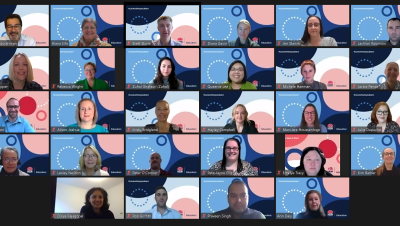
Check-in Assessments to enable student learning
Student Assessment Online Reporting Team, Department of Education
In response to concerns that student learning would be impaired from lockdowns, the Department of Education developed rapid assessments to monitor student progression and enable schools to tailor support. Check-in Assessments are an Australian-first tool created to identify potential literacy and numeracy gaps quickly and easily. The tool was first created in April 2020 and completed by almost 63,000 students within 4 months. The first results were returned to schools within 48 hours, providing rapid insights backed with specific resources. Given their outstanding value, Check-in Assessments now occur twice-yearly for 400,000 students in Years 3 to 9.
Partners: Student Assessment and Online Reporting team, Centre for Education Statistics and Evaluation
Putting Citizens at the Centre
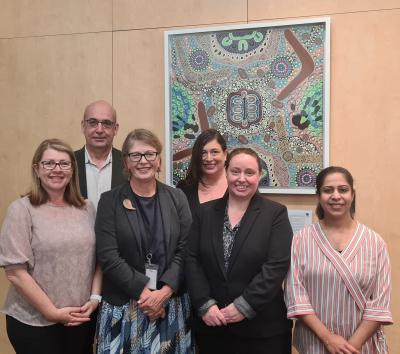
One organisation with the client at the centre
Client Service Unit and LawAccess NSW, Legal Aid NSW
When customers needed to engage with Legal Aid, they would experience multiple confusing entry points, inconsistent service, they would have to repeat their story to multiple people, and the most vulnerable clients were often missing out. The team created a single point of entry and integrate all systems to provide a seamless customer experience. They elevated LawAccess NSW to become the single contact centre for Legal Aid so that customers could be triaged and those with the greatest need supported accordingly. This single point of contact delivers the right service at the right time without customers having to tell their stories multiple times.
Partners: Department of Customer Service, Department of Communities and Justice
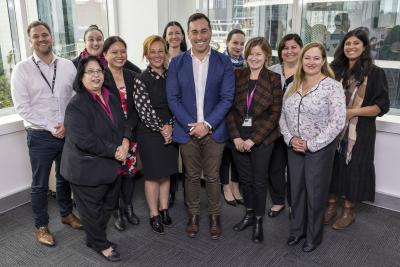
Community Pillar of the Delta Micro Strategy
Multicultural NSW
Multicultural NSW led the NSW Government’s Community Pillar of the Delta Micro Strategy and collaborated with 13 different government agencies to provide multiple points of support to communities across NSW. The response included 13 rounds of community and NGO grants which enabled nearly 700 community organisations to empower vulnerable communities with practical needs such as food, medical supplies, COVID information and testing kits. They provided translations to Public Health Orders, used the specialist knowledge of Aboriginal Affairs and the Centre for Aboriginal Health to support Aboriginal communities in western Sydney, and partnered with Police and Resilience NSW on emergency management and recovery coordination.
Partners: Aboriginal Affairs, Centre for Aboriginal Health, NSW Police, Resilience NSW
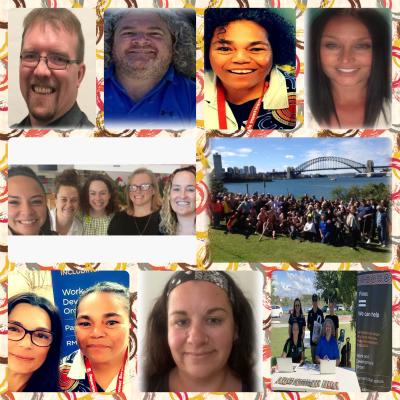
First Nations Support Program
Revenue NSW
First Nations people are over-represented in the fines system, which disproportionately impacts their social and economic participation and results in a cycle of escalating disadvantage. Revenue NSW transformed their services to increase engagement with First Nations people by developing place-based, data-driven community action plans to tackle local issues and transforming their internal culture. This includes a First Nations Team providing culturally safe services, an awareness toolkit to reduce voting fines, a ‘Tell us Once’ program to reduce the impact of licence sanctions in remote communities and repealing legislation that caused citizens to fear they would be locked up because of fines.
Engaging with people in NSW to connect them with care in the community
Service NSW
The surge in COVID-19 cases over the 2021 Christmas holidays meant pathology testing centres were struggling to cope. Emergency departments and Ambulance services were overwhelmed by concerned patients who, with the right information and support could have been safely cared at home. To support the mandatory reporting of RAT results, DCS and NSW Health collaborated to rapidly deliver a digital solution to enable people to register a positive test, screen themselves for risk, and access care providers where required. Delivered in record time, this immediately relieved pressure on hospital EDs and Ambulance services and provided reassurance and access to resources for worried patients turnaround.
Partners: Department of Customer Service, NSW Health
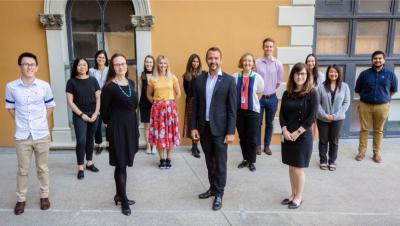
THIS WAY UP mental health service
The Clinical Research Unit for Anxiety and Depression, St Vincent’s Health Network
THIS WAY UP is a digital mental health service that offers a suite of tailor-made internet-based Cognitive Behavioural Therapy programs for the management of depression, anxiety and psychological wellbeing. This form of therapy has been shown to be as effective as face-to-face therapy. The demand for mental health services increased dramatically during the COVID-19 pandemic, so as part of St Vincent's COVID-19 response, THIS WAY UP waived the fee for all programs. This resulted in significant increases in users accessing and benefiting from the online treatment programs and clinicians integrating digital treatments into routine care.
Partners: The University of New South Wales
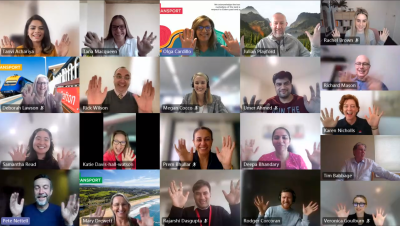
Digital Vehicle Registration
Transport for NSW and Service NSW
In partnership with Service NSW, Transport launched the revolutionary Digital Vehicle Registration (DVR) in March 2022. DVR uses digital platforms to deliver timely alerts and enable citizens to manage their entire registration renewal online. Motorists who opt-in receive reminder notifications via email, in their MyServiceNSW account and via app notifications. They can also access a real-time digital Certificate of Registration. DVR saves drivers time, reduces the carbon footprint from paper renewals, reduces the number of unregistered vehicles and will save taxpayers $10 million over 5 years. More than 200,000 motorists have opted into the new digital service since its launch.
Recovery and Resilience
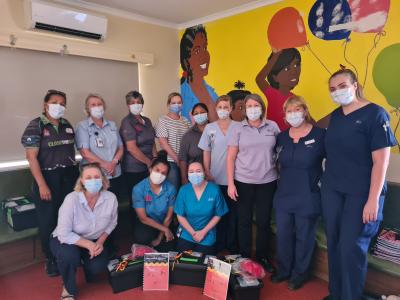
COVID-19 Community Response in Regional NSW
Far West Local Health District
In 2021, Wilcannia, a town of around 700 people in Far West NSW, faced a significant COVID-19 outbreak. Far West LHD collaborated with a number of NSW Government agencies, local government councils and community organisations to support the people of Wilcannia. The response was supported by a diverse COVID-19 community response team, a local emergency management centre, and community supported accommodation. With a high Aboriginal and Torres Strait Islander population, the response worked alongside local leads and elders to ensure a safe, sustainable, culturally appropriate, person-centred response that focused on clinical and non-clinical needs for those impacted by COVID-19.
Partners: Royal Flying Doctors Service, Maari Ma Health, NSW Department of Education, NSW Police, Local Aboriginal Lands Council, Central Darling Shire Council, Fire and Rescue NSW, Australian Defence Force, Resilience NSW, State Emergency Service, Wilcannia Safe House, State Health Emergency Operations Centre, community members, Elders and local key contacts
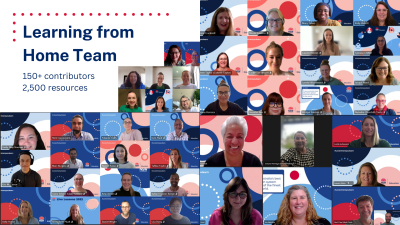
Learning from Home: A Crisis Solution
Learning from Home Team, Department of Education
As the pandemic escalated in 2020, the Learning from Home Team was required to move deftly to design and implement a central, high quality and accessible digital curriculum for thousands of schools. The first phase was produced in 16 days and supported curriculum from early childhood to Higher School Certificate, and over the next 18 months, the team developed over 2,500 teaching and learning instructional videos, resources and digital packages. Ongoing consultation across the school community informed improvements as the pandemic progressed. This became Australia’s leading remote school learning program which empowered teachers, schools and parents to support the continuity of learning for one million NSW students.

Empowering Community Groups
Multicultural NSW
During the pandemic, Multicultural NSW helped to save lives across NSW by building on existing community partnerships and creating a successful, place-based strategy that empowered communities. They delivered $38 million of grant funding to more than 600 organisations, which was informed by 700 individual consultations with community leaders. The team also developed a Community Connector Network across 12 Local Government Areas, which created partnerships that linked NSW Government and Emergency Services to non-government relief organisations and increased the efficiency of grant funding. These connections helped multicultural communities recover from lockdowns and strengthened their resilience.
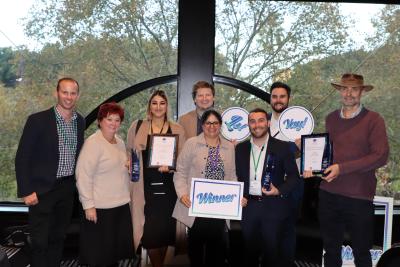
COVID-19 and Discharge Shuttle Service
Patient Transport Service, HealthShare NSW
To safely transport COVID-19 patients during the Delta outbreak, the Patient Transport Service team worked with National Patient Transport and the Clinical Excellence Commission to implement a new model to safely transport discharged COVID-19 patients from hospital to home via a shuttle service. Within 1 week, timeliness of COVID-19 transfers rose from 65 percent to 88 percent, despite an increase in demand of more than 1,000 percent across the system. The result was an improvement in patient flow during the peak of the outbreak, with patients spending less time in hospital. The shuttles were hugely successful, safely completing more than 16,000 COVID-19 transfers in 2021.
Partners: National Patient Transport (NPT), Clinical Excellence Commission (CEC), NSW Ministry of Health – System Flow Centre, State Health Emergency Operations Centre (SHEOC), NSW Ambulance & state-wide Local Health Districts
Regional NSW 2022 Flood Response
Public Works, Department of Regional NSW
The 2022 floods in the Northern Rivers were the worst on record, and flood response teams needed to mobilise to help communities deal with the consequences of the natural disaster. When flooding struck the Hawkesbury/Nepean while flood clean-up efforts were underway on the North Coast, teams responded to a second natural disaster. Teams mobilised immediately lending varied expertise to the situation. 80 evacuation centres were established for critical emergency accommodation, and more than 8,100 people sought shelter. When most major roads were blocked, teams were on the ground in Lismore providing emergency support.
Partners: Public Works, Department of Primary Industries, Local Land Services, Regional Development & Programs, Soil Conservation Service, Forestry Corporation of NSW, Biodiversity Conservation Trust, Department of Planning & Environment, RSPCA
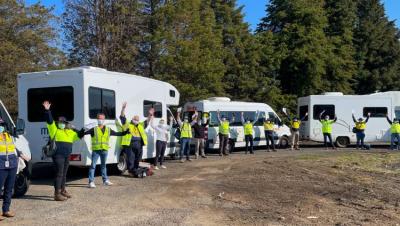
Wilcannia Campervan Convoy
Regional and Outer Metropolitan, Transport NSW
In September 2021, Transport for NSW assisted NSW Health by coordinating and delivering 34 campervans to the far west community of Wilcannia, where at-risk residents were particularly impacted by the COVID-19 crisis. When 108 people in the community tested positive to COVID-19, concerns were raised about their ability to safely isolate from infected family members in overcrowded homes. Transport's Regional Delivery team orchestrated an amazing achievement in a matter of days with over 80 staff across Transport's Regional and Outer Metropolitan Division (ROM) volunteering to participate in the campervan convoy to deliver much needed emergency accommodation for isolating patients in Wilcannia.
Partners: NSW Health
Securing Justice and Opportunity for Vulnerable People
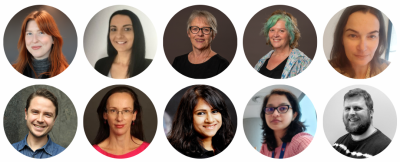
Make No Doubt sexual consent campaign
Department of Communities and Justice
This innovative community education campaign was developed to prevent sexual violence among young people aged 16 to 24 years. Consultation revealed the crucial need to educate young people about sexual consent as part of key changes to sexual consent laws in NSW. We worked with young people and the sector to develop an engaging social media and digital advertising campaign that provides clear, practical guidance on how to check consent. 84 percent of young people said the campaign would positively influence their attitudes and behaviour around consent. The campaign has also received widespread praise from sector stakeholders and mainstream media.
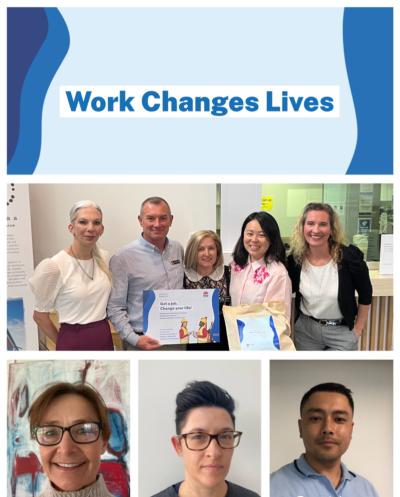
Pathways to Employment
Corrective Services NSW
Research suggests ex-offenders who gain stable employment after release from prison are 50 percent less likely to return to custody. The team established a pilot program to implement a structured process to enhance employment opportunities for women. This included a new service delivery model to address identified support gaps, engagement with employers and pre- and post-release tailored employment programs. The pilot resulted in a 60 percent employment rate and led to funding for additional resources to increase the scope to encompass all women exiting custody and also males. The project continues to evolve under the title ‘Pathways to Employment’.
Partners: Various organisations and companies in NSW seeking labour across industries including food services, warehousing and construction; training organisations offering vocational and pre-employment programs to support people exiting custody
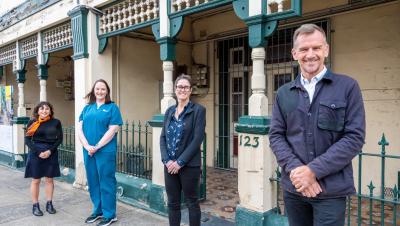
Boarding Houses – vulnerable population becoming more visible
Integrated Care, Sydney Local Health District
The population and health needs of Boarding House residents is poorly understood. Since the Sydney LHD catchment is home to 40 percent of all Boarding Houses in NSW, the congregate living and difficulty with public health messaging to residents created a major challenge for Sydney LHD during the pandemic. A specialist outreach team analysed the range of barriers and identified a range of innovative responses that not only contained any significant COVID outbreaks, but also provided a high-level understanding of Boarding Houses. The pandemic provided a foundation for new practices, research and in-reach services to Boarding Houses to meet residents’ health needs.
Partners: Newtown Neighbourhood Centre, Central and Eastern Primary Health Network, Department of Communities and Justice, Inner West Council, City of Sydney
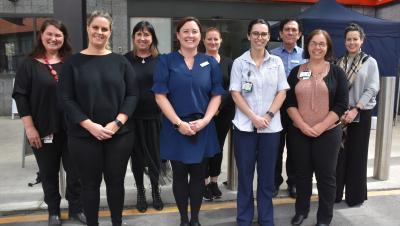
Domestic Violence, routine screening in the Royal North Shore Hospital Emergency Department
Royal North Shore Hospital, Northern Sydney Local Health District
The Domestic and Family Violence (DFV) routine screening program in Royal North Shore Hospital’s Emergency Department uses a multidisciplinary approach to identify women at risk of DFV and provide psychosocial support. Specialist registered nurses screen all women over 16 who present to the Emergency Department, with those identified as at risk of harm provided with appropriate referral and management strategies. A total of 16,380 women were screened in the past 12 months, with 412 identified as at risk of harm and provided access to immediate support.
Partners: Prevention & Response to Violence, Abuse & Neglect, Government Relations Branch, NSW Ministry of Health
South Western Sydney Prenatal Team
South Western Sydney District, Department of Communities and Justice
Designed and implemented from the ground up, the South Western Sydney Prenatal Team is drastically improving child protection service delivery and outcomes to our most vulnerable clients – expecting parents and unborn children who are reported at risk of significant harm. The team provide the highest quality specialised child protection services with a particular focus on the power of family-led decision making through prenatal family conferencing and building the strongest possible support networks around each family.
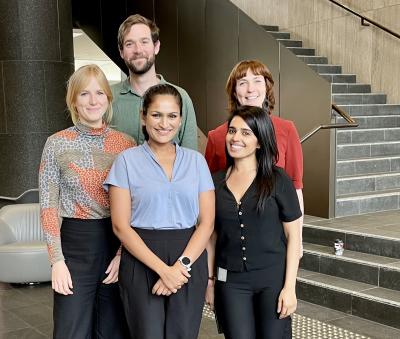
Justice Advocacy Service
Strategy, Policy and Commissioning, Department of Communities and Justice
The Justice Advocacy Service (JAS) fills a critical service gap in supporting people with a cognitive impairment in contact with the criminal justice system (CJS). The service responds to research that suggests people with a cognitive impairment are over-represented in the CJS, overlooked as a disability cohort, and highly vulnerable to becoming entrenched without appropriate support. Since 2019, JAS has provided state-wide support to over 4,000 victims, witnesses, suspects and defendants with a cognitive impairment during interactions with police and legal representatives, at court, and in custody.
Partners: Intellectual Disability Rights Service (IDRS)
Well Connected Communities with Quality Local Environments
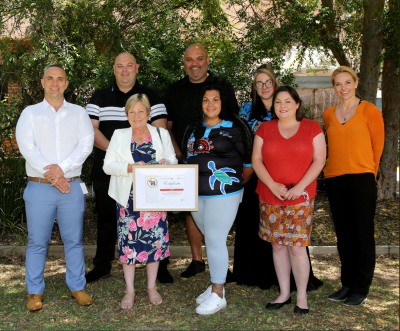
Aboriginal Mental Health – partnerships towards excellence
Aboriginal Mental Health Service, South Eastern Sydney Local Health District
Aboriginal people are three times as likely to be hospitalised for intentional self-harm, with suicide rates 1.4 times that of non-Indigenous people in NSW. In early 2020, SESLHD Mental Health Service adopted an innovative partnership approach with Local Aboriginal Land Councils and Corporations to plan, design and implement health services through the development of a community-based Aboriginal Mental Health Service Team. The team's primary role is to provide flexible, timely, and culturally safe care to empower and support Aboriginal people to access services. This new service approach is collaborative, compassionate and recovery-focused, based on the principles of self-determination and hope.
Partners: La Perouse Local Aboriginal Land Council, Kurranulla Aboriginal Corporation
Road to Home at Cabarita Reserve
Aboriginal Strategy and Outcomes – Roads to Home, Department of Planning & Environment
Roads to Home partnered with Forster Aboriginal Land Council to deliver $3.5 million in vital upgrades to former Aboriginal reserve, Cabarita Reserve. Works at Cabarita have included footpath construction, bioretention basins, full-width road seal, street lighting, wetland upgrades and stormwater drainage. The result of upgrading this essential infrastructure has been increased access to life saving emergency services like fire and ambulance. The upgrades have also enhanced quality of life by improving access to services like household waste collection, postal delivery and community transport. Multiple community members completed TAFE civil construction qualifications and ten local trainees were employed in the upgrade of their community.
Partners: Forster Local Aboriginal Land Council
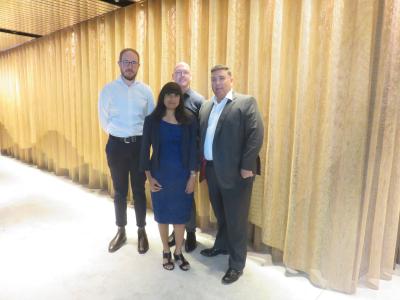
Working with local communities to support social and economic outcomes at Brewarrina
Property & Development NSW
Property & Development NSW was asked to find an alternative use for Brewarrina Correctional Facility focused on realising optimal community benefit. Community feedback highlighted the need for a women’s drug and alcohol rehabilitation centre. PDNSW worked collaboratively with Brewarrina Local Aboriginal Land Council resulting in the transfer of part of the land to the traditional owners for cultural preservation and primary and agricultural enterprises. Remaining land was transferred to the Brewarrina Shire Council and leased to Orana Haven Aboriginal Corporation to provide drug and alcohol rehabilitation services. Both outcomes will deliver social and economic benefits to a disadvantaged and marginalised community.
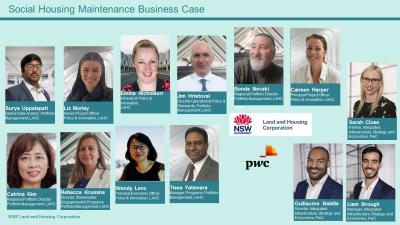
Benefits of Investment in Social Housing Capital Maintenance
Portfolio Management and Policy & Innovation Divisions, NSW Land and Housing Corporation
These teams collaborated to develop an evidence-based business case which produced a Benefit Cost Ratio of 1.72 – an Australian first in costing the benefits of investment in a social housing capital maintenance program. Land and Housing is pioneering new ways to manage its social housing portfolio of 125,000 homes to provide safe, appropriately maintained properties. Since Land and Housing is self-funded, they require capital maintenance funding to cover the cost of required upgrades without selling other social homes.
Partners: PwC
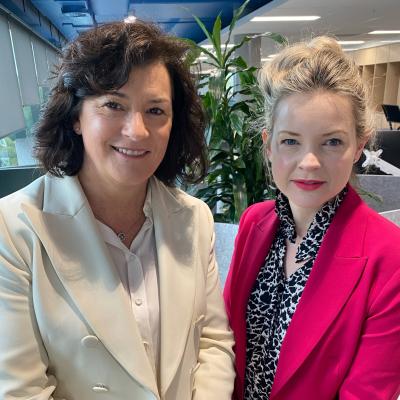
Decarbonising Paediatric Cancer Care
Sydney Children’s Hospitals Network
Decarbonising Paediatric Cancer Care is a program led by the Kids Cancer Centre at Sydney Children’s Hospital Randwick that takes a person-centred systems approach to carbon reduction in all aspects of cancer service delivery. Three projects underwrite a stronger, more sustainable future by removing 13.7 tonnes of carbon emissions and saving $630,000. They have delivered carbon reduction in clinical services, local policy, waste management and supply chain, helping to build a sustainable and resilient health system. This demonstrates how health systems adapt and how decarbonisation can be integrated as standard practice in the delivery of world-class healthcare.
Everyone's Business Learning about Stolen Generations
Workforce Inclusion and Experience, NSW Public Service Commission
The PSC has developed the ‘Everyone’s Business’ Aboriginal cultural awareness training in response to the Unfinished Business Report, which outlines NSW Government’s commitment to reparations for Stolen Generations survivors. The need for trauma-informed training and resources was identified in partnership with Aboriginal public sector employees and Stolen Generations survivors and organisations as the most culturally safe way to deliver training about the impacts of past forcible removal policies and practices. An innovative combination of storytelling and trauma-informed research has resulted in training which challenges self-reflection, increases knowledge and establishes practical ways to foster cultural safety for Aboriginal customers, colleagues and communities.
Partners: Bomaderry Aboriginal Children's Home, Coota Girls Aboriginal Corporation, Stolen Generation Council (NSW/ACT) Inc, Kinchela Boys Home Aboriginal Corporation